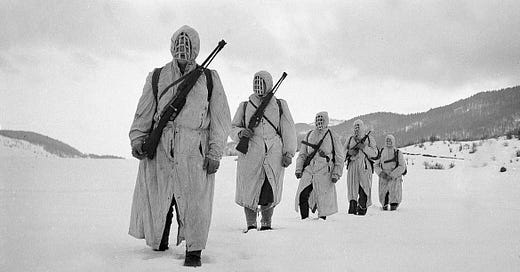When Opapa parachuted out of the Halifax bomber on February 7, 1945, he landed in northern Slovenia instead of southern Austria. It took him a while to realize this:
The first inkling we got that something was wrong was when, instead of the designated flat plateau, one snow-capped mountain after another rose around us as we descended. We landed on a mountainside in seven feet of snow.
Imagine the terror, as Opapa realized that this was absolutely not the place he was supposed to land. For five days, he “lived on emergency rations” and “observed the foot traffic” in the region.
Opapa went into more detail about his first days in Slovenia during his interview with Patrick O’Donnell, who wrote about the mission in Operatives, Spies, and Saboteurs:
“You go out and it seems an eternity before the parachute opens. The wind from the slipstream hits you like a hammer. As I parachuting down I landed in a tree. And instead of an open field, I landed in a steep valley between two snowcapped mountains.”
I love the detail from this quotation: I can imagine how it “seem[ed] like an eternity before the parachute opens.” And then, when it does open, the “the wind from the slipstream hits you like a hammer.”
Opapa also reveals some new information: he landed in a tree. He continues:
“I freed myself from the tree and found myself in about six feet of snow. We had snowshoes but they tore apart after I walked on them [so I] threw them away. I kept going downhill to the lights of a village. A truck passed by on the road to the village. I heard voices, they weren’t German, I figured I was in Slovenia in northern Yugoslavia. I flashed my flashlight to signal the other men on the team. All of a sudden the street lights went on in the village. I stopped flashing.”
Here, we can imagine the possibilities that must have been running through Opapa’s mind: how could he find his comrades? What territory had he found himself in? Was this region of Northern Slovenia in Nazi control? What was the safest plan of action?
Opapa opted to assume the worst:
“I assumed the Ustashe [Yugoslav collaborators] must have seen the plan circling above the village. So I hightailed up the mountain several miles from the village.”
It was a safe bet: the Ustashe were a fascist, pro-Nazi organization who were led by a murderous anti-Semite and anti-Serbian ultranationalist Croat named Ante Pavelic. They would have turned him over to the Nazis, or worse.
Opapa decided to run:
“I was climbing as fast as I could, hours seemed like minutes, and I traveled several miles away from the village.”
At this point, Opapa offers two somewhat conflicting narratives about what happened next. According to Patrick O’Donnell’s interview, Opapa recounted:
“I went as far as I could up the mountain, and strangely, I heard music. Lo and behold, it was a Partisan brigade with a brass band, holding a dance. They were having a wonderful time and weren’t afraid of the Germans.”
In his own autobiography, it took Opapa a bit longer to read the Yugoslav Partisans. After observing “foot traffic” and “living on emergency rations in my pockets for about five days,” he wrote that he finally approached “an isolated farmhouse” where he gave he “cover story” that he was “an American airman escaped from prison camp trying to rejoin my unit in Italy.”
Here is what happened:
“They gave me dinner and offered a bed but I chose to sleep by the door. The reason was that I could not afford the risk of any member of the family going out to notify the nearby German garrison of my presence. And the reason for my fear was the knowledge that if the Germans find out that they were hiding an allied soldier, they would shoot the whole family and burn the entire village. (I had walked by enough burned villages to know that that was not an idle threat).”
I imagine that Opapa did not sleep very well that night. But in the morning, the family kept their promise:
"The next morning the family's adolescent son said “come with me; I take you to the partisans.” I had no reason to doubt him, and, in any case, no choice. We climed a steep trail up the mountain. The scene that stayed with me most was going behind a waterfall where the mist washed out the footsteps. We could not be traced by a German patrol that may be on our trail.”
It was at this point that Opapa encountered the Partisans. Likely, he just gave an abbreviated version of the story during his interview with O’Donnell.
Here is how he described the Partisans in his own autobiograpy:
“The next scene I would never forget was what greeted me when we arrived at the Partisan brigade. In the midst of German-occupied territory, on top of a mountain, they were having a ball! There was a band, and drinking and dancing. I didn’t know if this was a regular event or just an occasional much needed morale-booster. The German retreat from the Balkans had made it necessary to secure their rear, and a ferocious clean-up operation had taken a heavy toll of the Partisans. A brigade of about 150 men was down to about 75 or 80 by the time I joined them.”
Tomorrow, I’ll dive a little deeper in the Partisans, and who - exactly - they were. Today, I will leave you with this photography I found of a Partisan patrol in Slovenia from 1945, to give you a visual image of the world Opapa had landed in:





Looks like a scene from Star Wars.